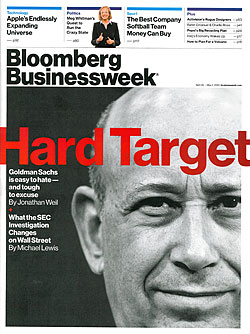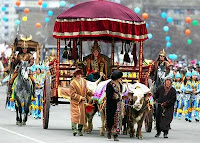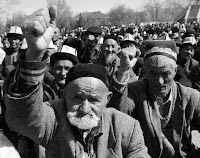 The new BusinessWeek, rechristened Bloomberg Businessweek, surged into mailboxes and onto newsstands in the last few days. Months in the making, the newest version of the magazine reflects the strengths of both the pub’s 80-year history and its new 1,700-journalist supporting staff. It also boasts a knockout layout, in some ways a return to the substance and elegance of the mag’s heyday of the 1990s with a contemporary gloss.
The new BusinessWeek, rechristened Bloomberg Businessweek, surged into mailboxes and onto newsstands in the last few days. Months in the making, the newest version of the magazine reflects the strengths of both the pub’s 80-year history and its new 1,700-journalist supporting staff. It also boasts a knockout layout, in some ways a return to the substance and elegance of the mag’s heyday of the 1990s with a contemporary gloss.
Indeed, the book overall is a refreshing mix of what made BW a winner in the past and some nice new touches. The Back to the Future treatment includes savvy analysis, depth and graceful writing, combined with a renewed focus on corporations, the finance world and politics. It’s a must-read once again! After too many years of thin books with too little to dine on, this new offering is a full-course meal again – complete with dessert (read on for that).
The new BW isn’t perfect. The Global Economics pages are a confusing jumble, the small-biz section needs work and at least one columnist is off the mark. But the mag overall is sleek and smart and gives readers some insights they won’t get elsewhere – which in the end has always been BW’s drawing card. After all, if the fish isn’t fresh, the wrapper hardly matters, no?
For a page-turning look, check here.
Overall, give this effort a B+, with expectations that As are on the way in future issues. Here are some specifics from a close review by an admittedly biased veteran:
COVER – Clean, dramatic, inviting. Love the powerful photo of Blankfein looking at once like he has only contempt for his critics even as he sorely needs a shot of Pepto-Bismol. “Hard Target” is a great Cover Line. All the white in the boxes and flag at the top seems a bit busy, though. Giving “Bloomberg” equal play with “Businessweek” in the flag is understandable politically, but it makes for a lot of crowded type in the top half of the cover. Grade: B+
CONTENTS PAGE – Knockout presentation. Well-arted and conveys substance.Grade: A
MASTHEAD – Nice to see it back after too long of an absence. The editor’s letter should appear regularly to draw attention to stories behind the stories. It lets readers connect with the writers and editors. Sadly, the staff is a shadow of the force it once was, but the Bloomberg global correspondent system is already bringing some depth not apparent from the masthead. Grade: B
INDEX – what is the point of the Robot Bully? Cartoon is a great idea. This execution is pointless. Find something original. Grade: C
OPENING REMARKS – Well done. This Economist takeoff, an editorial commentary on a story developed later in the book, brings to bear one of the key strengths of magazines: a clear point of view. The pieces here take readers beyond the daily paper – further beyond even than the stories — giving them a reason to read yet another piece about the big news of the day. Props, too, on the future spin in the Weil piece. Love both the Weil and Lewis treatments. Grade: A
GLOBAL ECONOMICS – Disappointing. It seems like a catch-all, a section in newspapers we used to call the “slop page.” Yes, variety can be intriguing. But the Iraq piece is flat and the timeline ridiculously thin and pointless, though nicely colorful. Loved the volcano and Greek crisis pieces, which had the virtue of timeliness. Seems like a more coherent focus on the economically oriented news of the week would work. But it’s hard to see any focus in the section – certainly economics is not what it’s about. And just why is a tractor cruising at the top of page 19? Seems to invite you to look ahead if you are bored with this page. Grade: D
COMPANIES & INDUSTRIES – Heart of the book. BW’s core franchise has been corporate coverage, though it got short shrift in recent years. It’s what employees, managers, shareholders and business partners of companies care about; a natural reader base. You’ve given the section its due here. Intriguing pieces about brand-name companies, with lots of variety, makes this a winning area. BW’s dismantled bureau network – a sad loss — would have been a key asset in putting this section together, and the job now falls to Bloomberg folks and skilled editors in NYC. Grade: A
POLITICS & POLICY – Smart and lively. Again, a core strength of the old BW given its due anew. Love the Emanuel Q&A and the Reshuffle in Obama Land. Why, though, is Zynga overlooking page 38? And James Warren’s column seems to come out of nowhere. Grade: A
TECHNOLOGY – A core franchise of the old BW, reborn. Yes, yes, yes, give us more, since this is the engine of the American economy. Traditionally, BW led the pack in tech and it would be nice to see it do so again. Grade: A
MARKETS & FINANCE – Another franchise area. Top-flight coverage of this crucial sector of the economy is central. Should be mandatory every week, along with Tech and Corp. Smart takes on Goldman here. Would have been nice to have a takeout on the new regulatory bill, however, since it looms large and scary on the horizon. Maybe next week. Grade: A-
ENTERPRISE – Winning idea. But the focus on the lede story is problematic. Is this about B&J or principles or payouts or what? Seems to stray. Whole section does, in fact. Small-biz is often a mixed-bag. Seems like a good idea, but it will be tough to execute well. Don’t get the point of Wadhwa’s column at all: does it just celebrate Boulder or offer a skimpy roadmap on how to duplicate it? Topic deserves a whole section, not just the once-over-lightly here. Grade: B-
FEATURE WELL – Whitman piece is interesting but could have been twice as good at half the length. Apple piece by Burrows, a pro, is superb and takes us well beyond the news – a classic BW treatment. And The City That Got Swapped is excellent, top-drawer psychedelic, as we once said. Love the Cooking with Gas piece, too. Grade: A
ETC – Wonderful, fresh stories, well-executed, well-arted. Not so sure about the Office Sneaker, but the rest hits the target. Nice break from the seriousness that went before. The Mulcahy piece is uneven, with a bit too much cliché for my taste. Hard to avoid pabulum in such pieces, even while you like hearing the voice of the subject. Every good meal needs dessert and this section is savory indeed. Grade: A
Can’t wait to see next week’s book.



